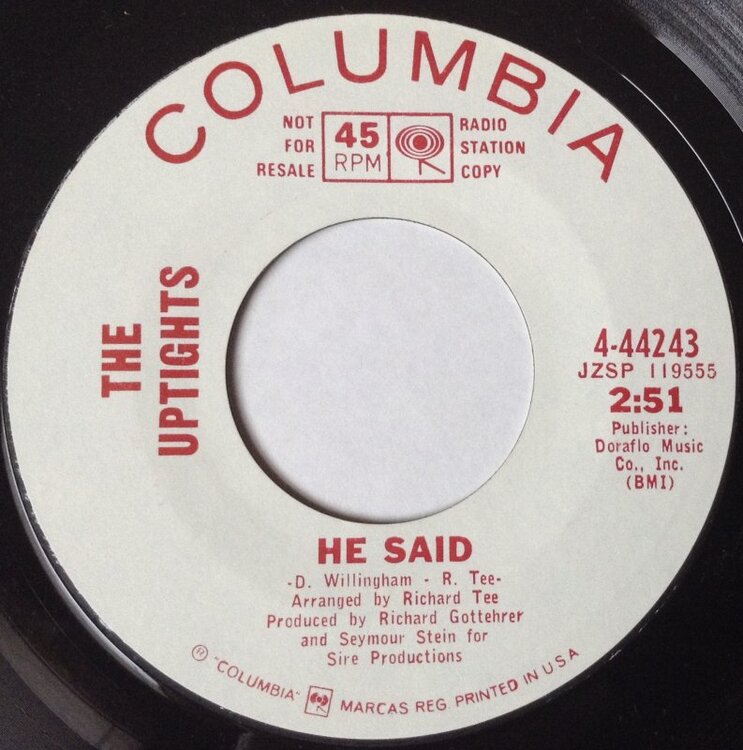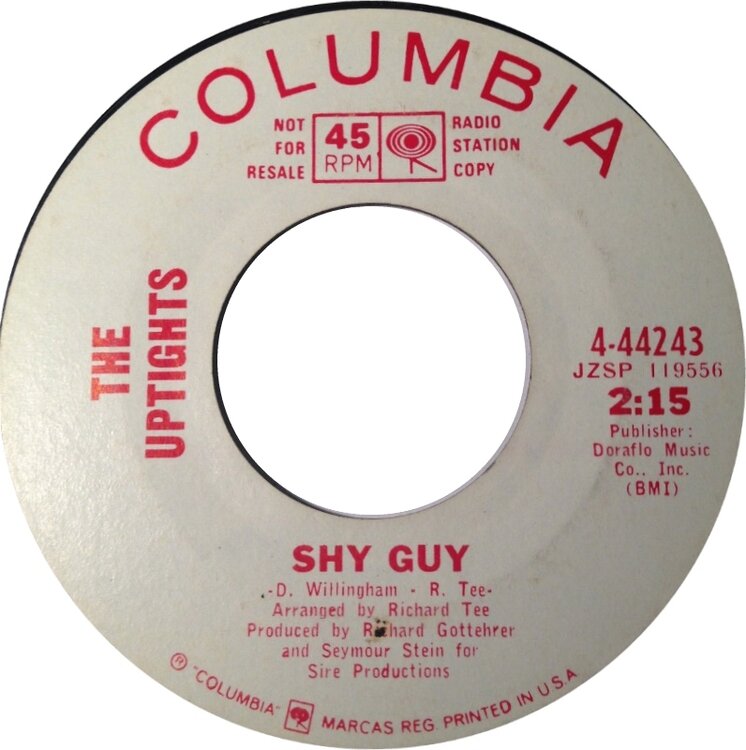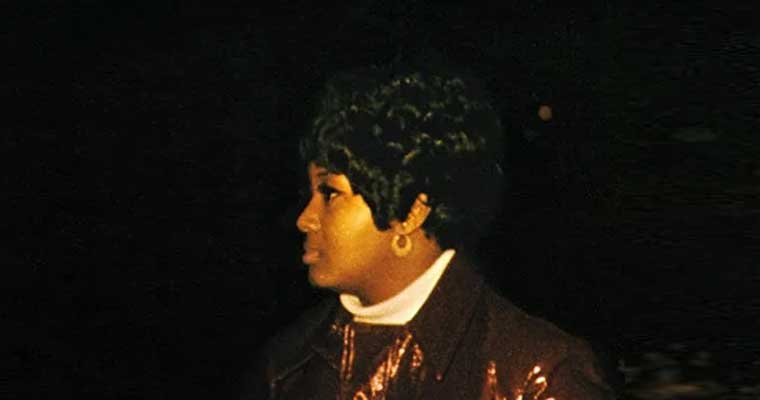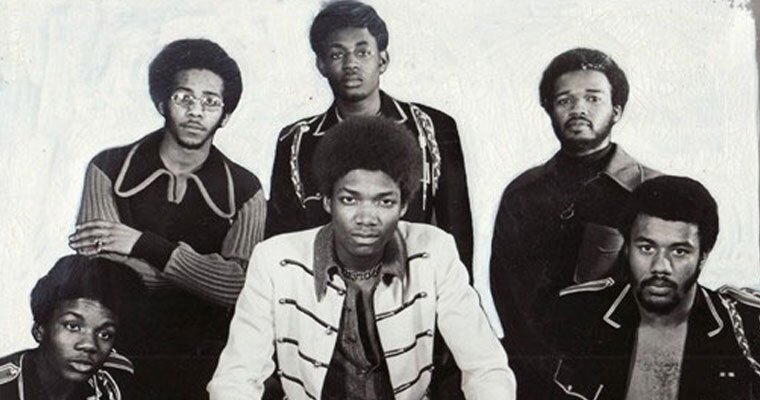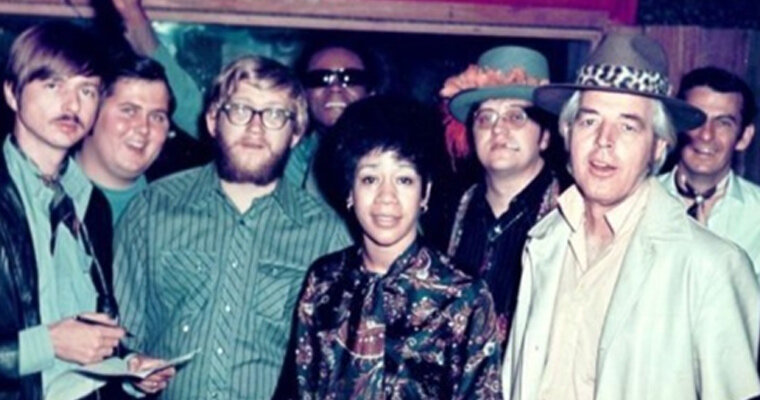-
Heartstoppers - the Curry sisters
One source on 45cat reckons the J. Curry who co-penned the two Mellowettes sides on their first single was Jeraldine (her birth spelling) rather than Joyce but I'll keep an open mind about that. This recording pre-dated the Heartstoppers recordings. I believe The Mellowettes' label (VRC), although standing for Vernell Record Company, was most likely owned or co-owned by Jerry Hankins who, some 4 years later in 1974 formed the also-Newark-based MPR (Magic People Records) label along with partners Jearldyne (sic) Curry and Beverly Crosby, as reported in the 2nd March 1974 edition of Record World. The first (only?) MPR release was Beverly Crosby's "Have We Become Prisoners" and "That Didn't Stop Me" (#MPM-40), both co-penned by Hankins and Crosby. There is no mention on the labels of the two other VRC Mellowettes-related 45s of either of the Curry sisters but it's quite likely one or both were in the group that supported both Judy McDonald (VC-114 released Jan 1971) and Little Willie Jones (VC-115).
-
Heartstoppers - the Curry sisters
Thank you Steve. Good info.
-
Heartstoppers - the Curry sisters
It’s possible Joyce Curry was also connected with or even part of The Mellowettes who cut for the Newark label VRC as a J Curry co-wrote both sides of their 1970 VRC single (#205). However there’s no label credits to her on the Judy McDonald and the Mellowettes VRC single
-
Heartstoppers - the Curry sisters
I am now pretty certain the later Uptights' two sides for Skye had Barbara Joyce (Lomas) on lead. The Sir Shambling site says so and so does the wikipedia entry for BT Express (her later group). This latter source does not extend her association with the Uptights to the much earlier Columbia outing and a guy responding to the funky 16 corners link shown above states that his grandmother was in the later Skye group and that it was definitely led by a girl called Barbara. So I'm sure it's not Barbara on the Columbia outing but equally I am also pretty sure that aurally it doesn't sound like Doris Duke either. Dukeburgundy above suggests it could possibly be June Adams and he suggests Teddy Vann (who produced all 3 of June's Roulette 45s) worked with the Uptights on their first record but the Columbia label clearly shows Gottehrer and Stein producing it for Sire Productions and furthermore there is no reference to Vann being involved in the Columbia release in this listing of Vann productions by Davie Gordon (who runs the 45cat web-site) - see here http://www.spectropop.com/archive/digest/d2063.htm
-
Heartstoppers - the Curry sisters
I also think Doris was the elder sister - when you finally finish an article there's inevitably something new that shows up! On Facebook, Terry Davinson has kindly drawn to my attention a 10th October 1967-released Columbia 44243 single by the Uptights featuring "Shy Guy" (which I'm sure Northern fans on this site will know) coupled with the slower, more emotive "He Said". Both sides are co-penned by Doris Willingham (Duke) and Richard Tee but on listening to them (they're both on You Tube) I don't think Doris is featured on vocals and this is an opinion confirmed by a Japanese soul web-site. This group of Uptights has apparently no connection with the group of that name who recorded for Skye under the Poindexter Brothers, the lead singer of that group being Barbara Joyce of BT Express fame. There was also a New Orleans group of the same name and an Uptights Band - again with no obvious connection to the New York-recorded group on Columbia. If anyone knows any of the personnel of 'this' particular group of Uptights I would be most interested.
- Doris Duke - Deep Soul Queen - Feature
- News: Doris Duke - Deep Soul Queen - Feature
-
Heartstoppers - the Curry sisters
Thanks for your kind comments. The 45 you are featuring is mentioned in my new article on Doris Duke which I believe Mike the admin is going to post to this group shortly. Keep a watch out for it. I also put an mp4 of both sides of the 45 on a Facebook group I belong to called Soul & R&B From The Vaults
-
Heartstoppers - the Curry sisters
I’m not sure if this has been proven before but I can confirm that sisters Joyce and Geraldine (birth name Jeraldine) Curry (comprising one half of the All Platinum group The Heartstoppers) are two of the three sisters of deep-soul favourite Doris Duke (birth surname Curry). These names appear as her sisters in her obituary and as they were all based in Newark NJ, the coincidence is far too great not be a fact. (Doris was born in Georgia but relocated to NJ at a very early age as she attended a Newark elementary school and then High School). She had one other sister, Regina, but I am not aware of her having a singing career. Those with an interest beyond soul might like to know that Doris’ husband Johnathan Augustus Willingham was Johnny ‘Gus’ Willingham, a founder-member of the doo-wop and R&B group The Cadillacs. Doris and ‘Gus’ had four sons.
- News: Timmy Willis Feature (Updated)
-
News: Timmy Willis Feature (Updated)
I don’t know as I never got to research that group but Capsoul was a Columbus label so I would think it was quite likely they were one and the same group. However I have now consulted the sleeve notes to the Numero 001 Capsoul Story CD and the (Four) Mints were doing well at the time of that concert and having local big hits on Capsoul, their number including Jimmy Harmon of Timeless Legend, and so I now think it almost certain that this was the Four Mints who were on that bill with Timmy Willis especially as it was a reunion concert relating to a part of Columbus and would probably have featured only Columbus-based/related acts. It’s just a pity there’s no mention of Timmy anywhere in the Numero notes - not that he recorded for Capsoul of course but was obviously quite a big local name (and national recording artist) at that time.
- News: Timmy Willis Feature (Updated)
-
Timmy Willis Feature (Updated)
Last year we (Soul Source) had the pleasure to publish a quality fully featured article by @Peternickols We now have a revised version of this article submitted by Pete To ensure that both his layout, images and text layouts are respected we have published this as a pdf version ' I have finally completed a completely new and much more detailed article on Timmy Willis. '
- News: Timmy Willis Feature (Updated)
-
Betty LaVette - He Made A Woman Out Of Me - Feature
“He Made A Woman Out Of Me” – Betty LaVette (Silver Fox 17) – 1969. I was born on a levee; a little bit south of Montgomery. Mama worked at the ‘big house’ and Daddy worked for the county. Never had no learnin’ till I turned sixteen, when Joe Henry came up the river y’all – he made a woman outta me, Lord, he made a woman outta me. I used to tease Joe Henry – I guess I teased too hard. Then, one day, it happened, right in my own back yard. Joe Henry had his way – he went and set me free; now I’m here to tell everybody that the man made a woman outta me, Lord, he made a woman outta me. When I think back to that day, so long ago, I get a good feelin’ on my mind. Even tho’ it hurt me, it’s one thing I know: that when he left, he left a woman behind. Ooh…Lord! And when I see another young man wantin’ to love and run, my mind goes back to Joe Henry Banks – what a heck of a job he done. Ain’t no other man let me down – y’see I’ve been set free; ever since way back yonder when Joe made a woman outta me…oh he made a woman outta me…Lord he made a woman otta me…wo oh oh oh, said he made a woman outta me. (Written by Fred Burch and Don Hill). In 1969, Betty LaVette appeared on Lelan Rogers’ fledgling Silver Fox label courtesy of his soon-to-be-much-better-known brother, country singer Kenny. It seems Bettye had cut a cover of his group, The First Edition’s 1967 track “Just Dropped In (To See What Condition My Condition Was In)”, penned by group-member Mickey Newbury and first featured on The First Edition’s late-1967 eponymous album (Reprise 6276) as well as on a quickly issued single (Reprise 0655). When Kenny was in town with the First Edition, Bettye and her manager, Jim Lewis, brought a copy of Bettye’s “cover version” over to the singer, who liked it and pitched it to his brother Lelan. Now, it turned out that Lelan had been Bettye’s promotion man for her impressive earlier Calla side “Let Me Down Easy” (#102) and he duly contacted Bettye about recording for him down at Stan Kesler’s Sounds Of Memphis studio for his new Silver Fox label, which was titled after Lelan’s own hair-colour-related nickname. The tracks which duly ensued were going to be grouped into what would have been Bettye’s first-ever album and Lelan had Shelby Singleton (who was largely funding – and would distribute – Silver Fox) buy the master of “Let Me Down Easy” because he wanted to also include that earlier track on the new album. In fact, the album never materialised because a later disagreement between Lelan and Shelby caused the latter to withdraw his support for Silver Fox, but nevertheless, in addition to a couple of duets with Hank Ballard, several very fine LaVette solo singles would creep onto the market, one of which was Bettye’s debut recording for the label, an outstanding example of southern storyline soul, "He Made A Woman Out Of Me". As with most great songs, the lyrics are very important and are meant to be heard. Like a good radio play, this song conjures up visions in the listener’s head. Although the recording took place in the big city of Memphis and the singer was raised hundreds of miles away in the north, near another big city, Detroit, the visions are of rural American southern life in the sixties (or perhaps, from even earlier) and the enforced subordinate role in that particular environment then played by most ‘blacks’. Erotic visions are created too and are fundamental to the piece – visions of a naïve, sixteen-year-old black girl’s first full sexual encounter when she loses her virginity to Joe Henry, an older black lad – yet there is also something genuinely touching about the way this is portrayed. The unspoken willingness of the girl to accept the inevitability of the encounter shines through. This isn’t rape or molestation; she really does like the guy and it’s something she has known for some time would almost certainly happen. Afterwards, she wants to remain Joe Henry’s girl but it isn’t to be. It’s her ‘first time’ – something she will, of course, never forget, yet something, we learn from the lyrics, she will later use to good effect to ensure no other man ‘loves her and runs’, as Joe did. The sexual act, though, ‘sets her free’ – she is liberated by it to the extent that she thereafter becomes mature enough to retain full control of her own sexual destiny, even if other forms of liberation, because of her race, her situation and the times in which she is living, will be hard, if not impossible to achieve. The lyrics, then, are both emotive and expressive and, for sixties America, undeniably raunchy. Without these ‘specific’ lyrics, though, the song would have been meaningless. After all, the title itself is straight-to-the-point, ‘he made a woman out of me’ directly implying that the girl only became a woman after her encounter, and had any song with such a title merely employed ‘moon and june’ lyrics, it would have rendered it, if not Joe Henry himself, impotent. However, the lyrics are not the only element which makes this a great recording. There’s Betty LaVette’s wonderful ‘earthy’ delivery, so ‘southern-sounding’ for a Michigan-raised girl. Her occasional lower-register use of the word ‘Lord’, both as an adjunct to an existing lyric-line and as an interjection, adds subtle emphasis to the emotion she expresses in the song. The different ‘shades’ she employs during her vocal performance are just perfect – layback and vulnerable one minute, up-front and firmly assertive the next. When maximum emotion is called for, she doesn’t scream like a gospel-wailer but rather howls and growls like a tiger being released from a cage – a woman, in fact, being released from the body of a young girl. Then, of course, there’s the overall ‘sound’ of the recording and the soulful ‘feel’ that it so successfully generates. This is largely down to the wholly appropriate, sparse, country-based, but tough-soul-edged arrangement and the way it is played by that quite remarkable backing band, The Dixie Flyers. The Flyers would become legendary in the early 70’s as Atlantic’s Criteria, Miami Studio ‘house-band’ and would play behind most of the name-acts contracted to their subsidiary Atco and Cotillion labels at that time; but earlier in 1969, just before Betty LaVette’s Memphis session, the band had played on Tony Joe White’s “Continued” album and this could be why Charlie Freeman’s wonderfully ‘swampy’, brooding guitar sounds so White-like on Betty’s recording. The musicians had taken their band-name from a literary reference to William Faulkner, which likened him to a southbound-train in the phrase “When the Dixie Flyer comes down the track you’d better get out of the way.” The Flyers at the time of Betty’s recording were Jim Dickinson and Mike Utley on keyboards, Charlie Freeman on guitar, Tommy McClure on bass and Sammy ‘Beaver’ Creason on drums. In addition to their own wonderfully rhythmic performance, we cannot overlook a potent contribution here by the ever-reliable Memphis Horns, who duly apply their trademark brassy raunchiness at suitably appropriate junctures. Taken as a whole, the recording is a high-point in smouldering, storyline country-tinged southern soul – one of those wonderful and rare occasions when all of the undeniably top-drawer participants came together at the peak of their considerable powers to produce a genuine ‘soul classic’. However, the lyrics proved too potent for many southern radio stations of the day and Betty’s version saw little ‘exposure’. Consequently it was not a pop hit although it did make No.25 on the R&B chart. Yet white country singer, Bobbie Gentry’s pacier and more throwaway ‘cover’ successfully ‘dodged the bullets’ by using the old ruse of airbrushing out some of the more potent lyrics. She completely omits mention of “then one day it happened, right in my own back yard” and specifically sings “I used to tease Joe Henry, I guess it served me right, it wasn’t long till he left me crying, out in the night.” She goes on to add that Joe had his ‘day’ (not his ‘way’). This ‘cleaner’ version, culled from her Fame-recorded “Fancy” album, whilst not a major hit, did at least make No.71 on the Pop chart, although it did not register on the Country or R&B charts. And so yet another great black-American original recording would fail to ‘crossover’, while a deliberately more-accessible, almost ‘singalong’ white ‘cover’ would go on to wider appeal. Peter Nickols Music Clips
Peternickols
Members
-
Joined
-
Last visited
-
Feedback
0%


